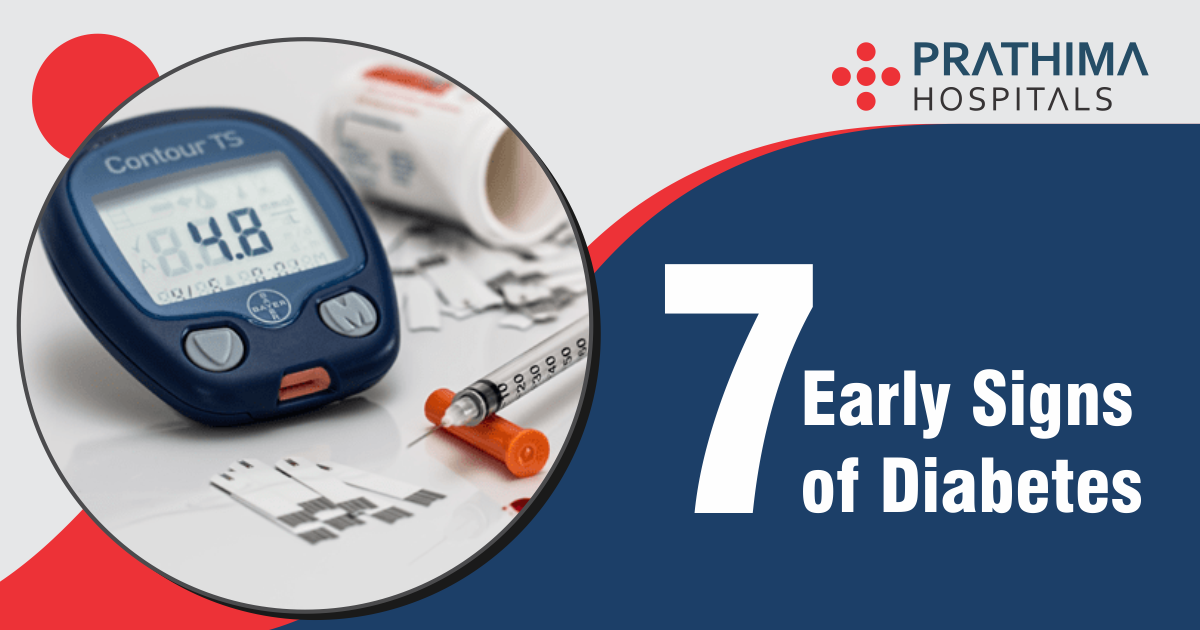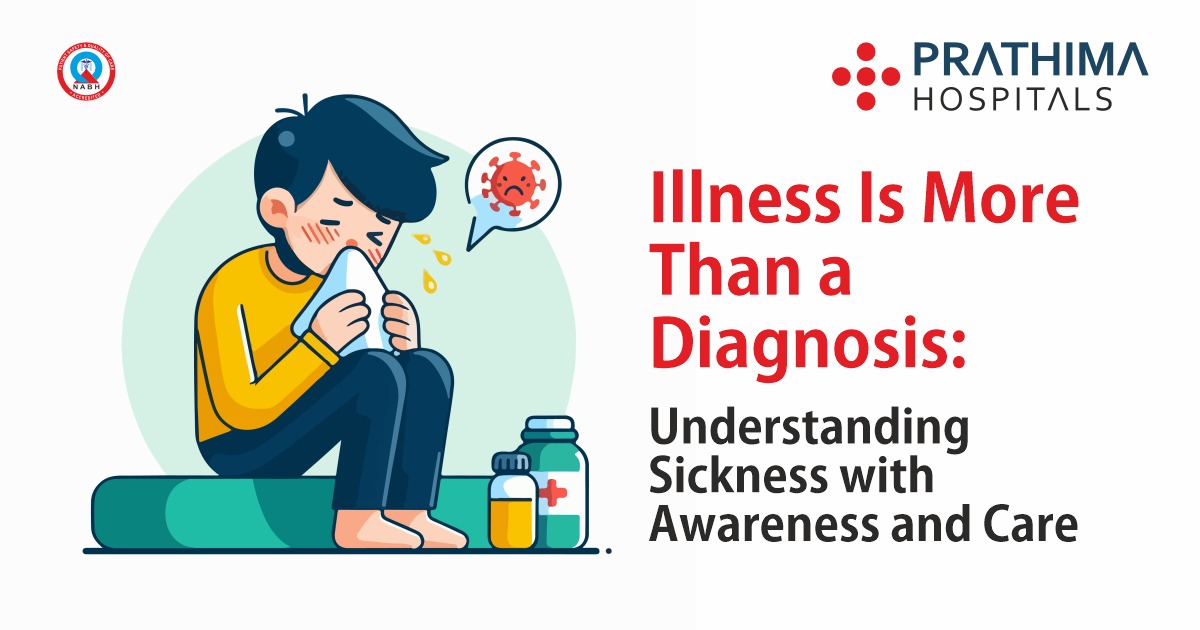7-Warning Signs of Diabetes You Shouldn’t Ignore!

7 Key Signs of Diabetes
Introduction:
Diabetes, a chronic metabolic disorder characterized by elevated blood sugar levels, affects millions of people worldwide. While it often goes unnoticed in its early stages, as said by the Best General Physician in Hyderabad diabetes can wreak havoc on various organs and systems in the body if left unmanaged. Understanding the warning signs that these organs and systems exhibit can play a crucial role in timely diagnosis and effective management of the condition. In this article, we will explore seven key body parts that can serve as early warning signals for excessive blood sugar levels, providing valuable insights into the importance of regular health monitoring.
Eyes: Diabetic Retinopathy
The eyes are often referred to as the “windows to the soul,” but they can also provide a glimpse into the state of one’s metabolic health. Diabetic retinopathy, a prevalent complication of diabetes, impacts the retinal blood vessels. Over time, elevated blood sugar levels can damage these blood vessels, leading to vision problems and, if left untreated, blindness. Blurred or distorted vision, dark spots, and difficulty seeing in low-light conditions are all potential signs of diabetic retinopathy. Regular eye examinations can help detect this condition early and prevent irreversible damage.
Skin: Diabetic Dermopathy
The skin, the body’s largest organ, can also reveal telltale signs of diabetes-related issues. Diabetic dermopathy is a skin condition characterized by small, round, light brown or red scaly patches that typically appear on the shins. These patches may be mistaken for age spots, but their presence can indicate poor blood sugar control. Individuals with diabetes are prone to skin infections and slower wound healing, further emphasizing the importance of proper skin care and vigilance.
Kidneys: Diabetic Nephropathy
According to the Best General Physician in Kukatpally, the kidneys have a vital function in purifying waste substances from the bloodstream. However, prolonged exposure to high blood sugar levels can damage the blood vessels within the kidneys, leading to diabetic nephropathy or kidney disease. Symptoms may include swelling in the legs, ankles, feet, and face, as well as changes in urinary frequency and colour. Regular monitoring of kidney function through blood and urine tests can help detect early signs of kidney damage and enable appropriate interventions.
Heart: Cardiovascular Complications
The heart is a vital organ responsible for pumping blood throughout the body, delivering oxygen and nutrients to cells and tissues. Diabetes can significantly impact cardiovascular health, increasing the risk of various heart-related complications. Elevated blood sugar levels, along with other factors often associated with diabetes, contribute to the development of these complications. Let’s delve into the details of cardiovascular complications in diabetes and explore how they can be managed and prevented.
- Atherosclerosis and Coronary Artery Disease (CAD):
Atherosclerosis, the buildup of plaque in the arteries, is a hallmark of many cardiovascular complications in diabetes. Over time, high blood sugar levels can damage the inner lining of blood vessels, leading to the accumulation of fatty deposits, cholesterol, and other substances. This process narrows and hardens the arteries, reducing blood flow and oxygen supply to the heart muscle. When this occurs in the coronary arteries, it’s known as coronary artery disease (CAD), which can lead to chest pain (angina), heart attacks, and even heart failure.
- Hypertension (High Blood Pressure):
Diabetes and hypertension often go hand in hand, forming a dangerous combination that increases the risk of heart disease. Elevated blood sugar levels can damage blood vessels and contribute to arterial stiffness, leading to higher blood pressure. Hypertension strains the heart, making it work harder to pump blood and increasing the risk of heart attacks, strokes, and heart failure.
- Heart Attack (Myocardial Infarction):
A heart attack occurs when the blood supply to a part of the heart muscle is blocked, usually due to a blood clot formed on a ruptured plaque in a coronary artery. Individuals with diabetes are at a higher risk of heart attacks due to the accelerated development of atherosclerosis and increased susceptibility to blood clot formation. The damage caused by a heart attack can weaken the heart muscle and impair its ability to pump effectively.
- Heart Failure:
Heart failure is a condition where the heart’s ability to pump blood is compromised, leading to fluid buildup in the lungs and other parts of the body. Diabetes can damage the heart muscle and blood vessels, increasing the risk of heart failure. Additionally, individuals with diabetes may develop diabetic cardiomyopathy, a condition characterized by structural and functional changes in the heart muscle, further contributing to heart failure.
- Arrhythmias:
Diabetes can disrupt the electrical signals that control the heartbeat, leading to abnormal heart rhythms (arrhythmias). These irregular rhythms can increase the risk of blood clots, stroke, and other cardiovascular complications as per the Best General Physician in Kachiguda. Both high and low blood sugar levels can trigger arrhythmias in individuals with diabetes.
Adopting a heart-healthy lifestyle, including regular exercise, a balanced diet, and stress management, can help mitigate these risks.
Feet: Diabetic Neuropathy
The feet are susceptible to nerve damage in individuals with diabetes, a condition known as diabetic neuropathy. Tingling, numbness, or pain in the feet and lower limbs are common symptoms. Moreover, because neuropathy can reduce sensation, individuals with diabetes may not notice minor injuries or sores on their feet, which can lead to infections and even amputations if left untreated. Daily foot care and regular check-ups with a healthcare professional are essential for preventing and managing diabetic neuropathy.
Mouth: Periodontal Disease
The mouth serves as the gateway to our overall health, and maintaining good oral hygiene is essential for preventing a range of dental and systemic health issues. Periodontal disease, often referred to as gum disease, is a persistent inflammatory ailment that impacts the underlying frameworks of teeth, encompassing the gums, bones, and ligaments. There is a strong association between periodontal disease and diabetes, with each condition influencing the other. In this detailed exploration, we will delve into the causes, and symptoms of periodontal disease, focusing on its intricate relationship with diabetes.
Causes of Periodontal Disease:
Periodontal disease typically develops due to the accumulation of plaque, a sticky film of bacteria, on the teeth and gums. Poor oral hygiene practices allow plaque to build up, leading to inflammation and infection. Over time, the inflammation can progress from mild gingivitis (gum inflammation) to more severe periodontitis (gum and bone inflammation). For individuals with diabetes, uncontrolled blood sugar levels can weaken the immune system’s ability to fight off infections, making them more susceptible to periodontal disease.
Symptoms of Periodontal Disease:
- Gum Inflammation: Red, swollen, and bleeding gums, particularly during brushing or flossing.
- Bad Breath: Persistent bad breath, also known as halitosis, is a common sign of gum disease.
- Gum Recession: The gums may start to pull away from the teeth, causing pockets to form between the teeth and gums.
- Tooth Sensitivity: Tooth sensitivity entails heightened responsiveness to hot, cold, sugary, or acidic foods and beverages.
- Loose Teeth: As the bone supporting the teeth is affected, teeth may become loose or shift out of position.
Maintaining excellent oral hygiene practices and scheduling regular dental check-ups are crucial for preventing and managing periodontal disease.
Nervous System: Autonomic Neuropathy:
Diabetes has the capacity to influence the autonomic nervous system, responsible for regulating involuntary bodily functions like heart rate, digestion, and perspiration as per the Best General Physician in KPHB. Autonomic neuropathy can lead to issues such as digestive problems, urinary dysfunction, and abnormal sweating. Additionally, fluctuations in blood pressure and heart rate may occur, increasing the risk of dizziness and fainting. Regular monitoring of blood pressure, blood sugar levels, and heart rate, along with maintaining a healthy lifestyle, can help manage autonomic neuropathy.
Conclusion:
Incorporating these early warning signs into routine health monitoring can significantly aid in the early detection and management of diabetes. By paying attention to the health of our eyes, skin, kidneys, heart, feet, mouth, and nervous system, individuals with diabetes and those at risk can take proactive steps to prevent or mitigate the potentially devastating effects of excessive blood sugar levels. Moreover, a comprehensive approach that includes regular medical check-ups, a balanced diet, physical activity, medication adherence, and stress management can contribute to overall well-being and improved quality of life for individuals living with diabetes. Remember, knowledge is power, and understanding the body’s warning signals is a vital tool in the fight against diabetes.
.
.
.
.
.
For More Details:
📞:: 733 733 6600 | 040 4345 4345
🌐:: https://prathimahospitals.com/book-appointment/






Warning: Undefined variable $req in /home/u885608126/domains/prathimahospitals.com/public_html/wp-content/themes/prathimahospitals/functions.php on line 294
Warning: Undefined variable $commenter in /home/u885608126/domains/prathimahospitals.com/public_html/wp-content/themes/prathimahospitals/functions.php on line 295
Warning: Trying to access array offset on value of type null in /home/u885608126/domains/prathimahospitals.com/public_html/wp-content/themes/prathimahospitals/functions.php on line 295
Warning: Undefined variable $aria_req in /home/u885608126/domains/prathimahospitals.com/public_html/wp-content/themes/prathimahospitals/functions.php on line 295
Warning: Undefined variable $req in /home/u885608126/domains/prathimahospitals.com/public_html/wp-content/themes/prathimahospitals/functions.php on line 298
Warning: Undefined variable $commenter in /home/u885608126/domains/prathimahospitals.com/public_html/wp-content/themes/prathimahospitals/functions.php on line 299
Warning: Trying to access array offset on value of type null in /home/u885608126/domains/prathimahospitals.com/public_html/wp-content/themes/prathimahospitals/functions.php on line 299
Warning: Undefined variable $aria_req in /home/u885608126/domains/prathimahospitals.com/public_html/wp-content/themes/prathimahospitals/functions.php on line 300
Warning: Undefined variable $commenter in /home/u885608126/domains/prathimahospitals.com/public_html/wp-content/themes/prathimahospitals/functions.php on line 303
Warning: Trying to access array offset on value of type null in /home/u885608126/domains/prathimahospitals.com/public_html/wp-content/themes/prathimahospitals/functions.php on line 303